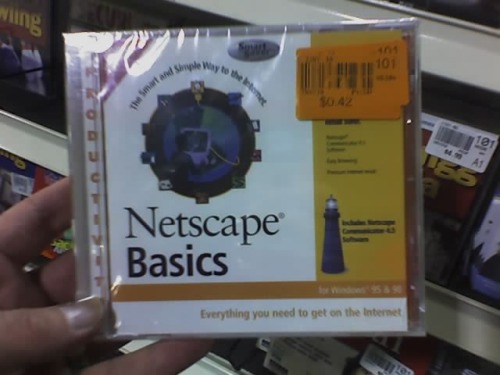 It’s been a long time coming, but AOL has officially decided to shut down the Netscape web browser. The final security updates for Netscape 9 will go out in February, and then that’s it.
It’s been a long time coming, but AOL has officially decided to shut down the Netscape web browser. The final security updates for Netscape 9 will go out in February, and then that’s it.
It’s been on life support for a while now, as AOL has tried repeatedly to revive it. After they dismantled the Netscape team in 2003 (just before spinning off the Mozilla Foundation), everyone expected that would be the end, but they came back with a surprise update, Netscape 7.2, the following year. Then they hired an outside company to reinvent it as a mash-up of Firefox and Internet Explorer, producing the Netscape 8 chimera. And just a few months ago, they went back to the well and released the Firefox-based Netscape 9, trying for the Flock model of integration with social networking sites…but only integrating with their own.
So what killed it? Netscape was arguably the pioneer, building on Mosaic’s success to create the first widely-used browser on the fledgling World Wide Web.
- Internet Explorer being pre-installed on every Windows desktop
- The commercial-to-freeware transition. Back in the 1990s, the only business model for giving away a free web browser was to subsidise it with revenue from other products. This led to selling the company to AOL, and opening the source code.
- The missing Netscape 5. IE5 was considerably better than IE4, and arguably better than Netscape 4 in some areas. And Netscape didn’t have a new version to compete, because…
- The transition to open-source took a lot longer than expected, leading to…
- The disastrous Netscape 6. While there’s something to be said for meeting deadlines, Netscape 6 was a prime example of why not to release early. The program just wasn’t ready (Mozilla actually declared the code to be 0.6), and it turned off many users who might otherwise have stuck around a little longer for a stable release.
- Fundamentally, though, AOL never seemed to know what to do with it. Is it a product? An exploitable brand name? A threat to brandish during contract negotiations with Microsoft?
 It’s interesting that, as I made this list, I realized that the transition to open source really didn’t help Netscape, the company. But it led to the formation of the Mozilla Foundation and the release of Firefox, one of the most visible open source success stories out there. The company and brand name withered, but the code itself flourished.
It’s interesting that, as I made this list, I realized that the transition to open source really didn’t help Netscape, the company. But it led to the formation of the Mozilla Foundation and the release of Firefox, one of the most visible open source success stories out there. The company and brand name withered, but the code itself flourished.
Like the demise of IE/Mac, it’s more of a symbolic end than one of substance. In my opinion, the true “heir” so to speak of the early Netscape has been Mozilla, and now Firefox, for quite some time.
Update: Asa Dotzler has a somewhat less nostalgic take on the matter, as well as a link to commentary at TechCrunch. I can’t believe I forgot to mention the crippling/crufting of Netscape 6-7 as compared to Mozilla.
Update 2: More comments at Slashdot. Gee, I wonder who submitted that story? 😉
Update 3: Some commentary from the Web Standards Project, with a somewhat familiar-looking title.
(via Opera Watch)




